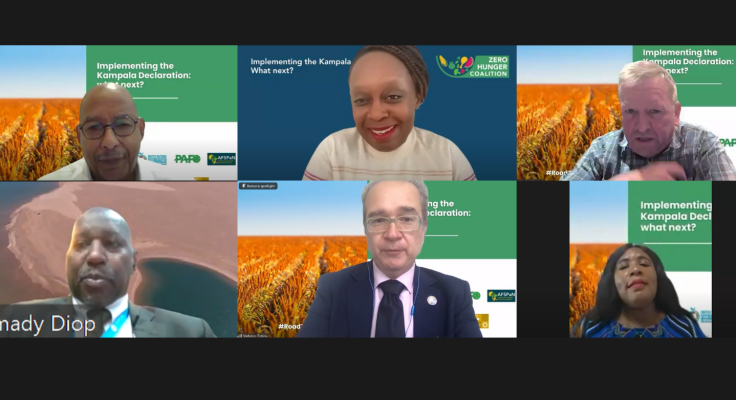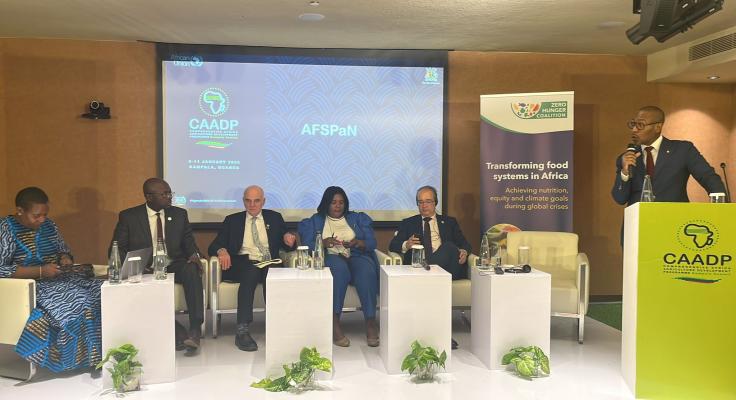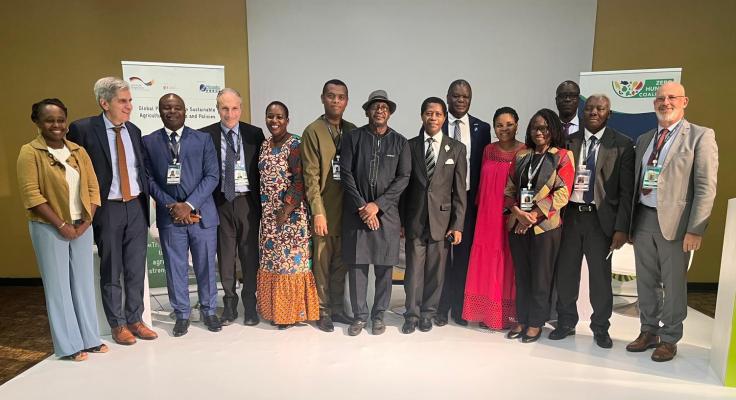Unlocking finance to deliver on the promise of the Post-Malabo Agenda
The Kampala Declaration represents an ambitious vision to transform Africa’s agrifood systems, addressing food insecurity and malnutrition, enhancing climate resilience, and fostering inclusive and sustainable economic growth.
However, achieving this ambitious target requires a level of investment far beyond what has been deployed to date. To better understand how such financial resources can be mobilised, the Zero Hunger Coalition brought together civil society advocates and financial practitioners for a discussion moderated by Hon. Jeremy Lissouba, Member of Parliament, Republic of Congo, and Secretary General for the African Food Systems Parliamentary Network (AFSPaN).
The event has been co-organised with the African Food Systems Parliamentary Network (AFSPaN), Oxfam South Africa, the Shamba Centre for Food & Climate, SDG2 Advocay Hub and the Consortium of African Youth in Agriculture and Climate Change (CAYACC)
As the panelists indicated, advancing blended finance models, leveraging domestic resources, focusing on sustainable solutions and fostering good governance, can enable Africa to build resilient, self-sufficient agrifood systems that not only address immediate challenges but also secure long-term prosperity.
Changing the current economic and political situation
The current confluence of crises caused by rising food prices, debt pressures, and political unrest demonstrates that the current trajectory cannot continue. For Lebogang Ramafoko from OXFAM South Africa, “Civil society is demanding changes and governments are too slow in their reaction. We cannot engage in business as usual.”
The continent’s debt crisis, stemming from high borrowing levels, unfavorable terms, and systemic inequities within the global financial system, results in debt distress in many countries. As noted Jason Braganza, from the African Forum and Network on Debt and Development (AFRODAD), “Close to half of the continent is paying more in debt servicing and interest repayment than in public investment in health and education.” This has also resulted in a lack of government investments in agriculture and food production systems.
Africa has not been immune to global political shocks such as the war in Ukraine and its impact on the supply of grain. For this reason, Mr Branganza called for a political reconsideration of how the continent sources and produces food. As he reminded participants, food is essential for peace and social cohesion while agriculture serves as a significant economic driver.
Advancing blended finance
Mobilising private capital into the agrifood sector in Africa is challenged by a number of actual and perceived risks. According to Aakif Merchant from Convergence, these risks include foreign exchange fluctuations and country credit ratings, as well as the small size of the investment deals. To overcome these challenges and present more attractive opportunities to investors, Mr Merchant highlighted the success of aggregating smaller transactions into larger portfolios and utilising blended finance, such as first-loss guarantees, to reduce risks. According to findings from Convergence, there are currently 1200 blended finance deals in Africa, of which 25% are in the agrifood sector.
“In an ideal world, markets should function efficiently, and capital should be flowing. Unfortunately, that is not the case. We want to mobilise the private sector, including investors of different sizes and different risk appetites. The idea is to use concessional capital to bring in private capital that is on the sidelines,” noted Mr Merchant. He suggested that to bring in large pools of capital, it is important to consider non-traditional countries, such as those in the Gulf as well as foundations and other private institutions.
Myrtho Vlastou from Incofin Investment Management presented the Nutritious Foods Financing Facility (N3F), which is a blended finance investment fund that supports small and medium-sized enterprises (SMEs) that provide nutritious foods for local markets. “These SMEs produce 80% calories consumed locally yet they lack the opportunity to grow and diversify their offer,” she noted.
The fund uses catalytic capital to mobilise additional capital from the private sector. To make it viable, a blended approach is used with a layered capital structure that can address the risk appetite of a variety of investors. As she explained, “For us, innovation is about addressing unmet needs and providing solutions that will make the region more prosperous in the long term.”
Focusing on sustainable local solutions
For impact investing to bring additionality, it must offer new propositions rather than replace existing schemes. For Ms Vlastou, this requires long-term funding, flexible mechanism and the ability to accompany producers with technical assistance. “With our technical assistance, we want to build resilience that can serve businesses after the loan cycle has ended,” she noted.
Cash crops, such as raw materials for export, have benefited from investment, but are increasingly questioned by impact investors. Instead, explained Ms Vlastou, investors are realising the importance of local value creation, such as processing crops locally which can also bring new jobs and income to the region.
This position aligns well with Mr Braganza’s call for a re-orientation of food production away from cash crops and towards food cropping. As he noted, “We produce what we don’t consume and consume what we don’t produce.” In addition, Mr Braganza called for greater investment in indigenous African companies, highlighting the need to distinguish between global multinationals and African investors when mobilising private capital. For this reason, policies that de-risk private sector investments must ensure that local value creation is prioritised.
Leveraging domestic resources
According to Mr Merchant, Africa holds over $1 trillion in financial resources that could be leveraged in domestic markets. This untapped resource is comprised of pension funds, sovereign wealth funds as well as insurance companies.
In Rwanda, the sovereign wealth fund, Agaciro Development Fund, has been used to leverage investment in agribusinesses. As its head, Jerry Ntare, explained, the fund has supported initiatives such as Africa Improved Foods (AIF) with additional funding from donors and the World Food Program. AIF, which produces fortified foods for pregnant women and infants, has not only improved nutrition but also provided extension services that helped farmers reduce the rate of aflattoxin in their maize from over 90 percent to 3 percent.
As its next priority, Agaciro Development Fund is planning to focus on a collaborative model in storage and cold chain infrastructure to reduce food waste. It plans to serve as an anchor investor which can bring greater confidence to the market. “We see opportunities in the agrifood sector and not just in terms of impact but also return,” he added.
However, for a sovereign wealth fund to support such initiatives, it is essential to put in place a flexible regulatory regime. “We advocate that policy makers put in place policies that are sufficiently flexible to support companies and to create an environment that makes investors comfortable,” he noted.
Fostering good governance
Ultimately, however, good governance is key. Governments ultimately create regulatory framework that encourage investment. “Without stable regulatory environments, no amount of de-risking mechanisms can attract long-term investments,” highlighted Mr Merchant. Mozambique and Sudan are two examples of countries where political unrest has destabilised investor confidence.
For Ms Ramafoko, civil society plays a critical role in holding governments accountable and advocating for inclusive policies. As she concluded, finance is about people and, for this reason, people must be placed at the centre of financing strategies.
WATCH THE FULL WEBINAR HERE
Note:
This webinar is part of the Road to Kampala initiative which advances action-oriented discussions with high-level experts on topics key to the implementation of the Kampala Declaration.



